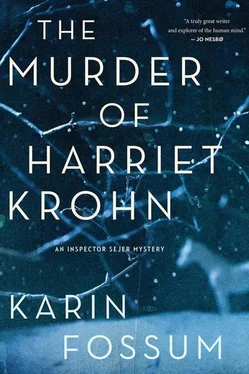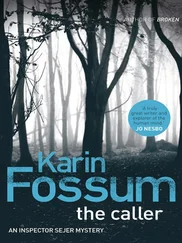So, is he allergic to himself? He shakes his head and reads on.
The symptoms are muscle stiffness and poor control of movement, especially in the legs. Impaired or double vision is also very common. Muscle tightening and reflex twitching can be very troublesome. As yet there is no treatment that can cure the disease. Hormone treatment, especially with ACTH and similar products, appears to shorten the acute attacks of the illness. There are multiple sclerosis associations in countries across the world, including Norway.
He slams the book shut.
No, he’s not joining any association; he’s not acknowledging this. He doesn’t want to know about other people who are suffering from the same thing. He doesn’t want to talk to them. He goes to the window and stands there with his hand in front of his mouth. Lays his brow against the cool glass. It’s happening now, inside his body. His nerve coverings are being eaten up, and he can’t prevent it. It’s happening as he stands here, breathing into his hand, and it will go on for the rest of his life. Oh, God, now he’ll have to pay. He glances quickly up at the sky. It’s just the same damn blue. Terrifying images appear in his mind’s eye. Him, sitting in a chair with a rug across his knees. A catheter partly hidden beneath the rug. Useless, white uncoordinated feet. His face and body distorted by cortisone, an unpleasant whiff of disease, a vanishing physique. An onlooker of life. Watching while others live, do, and work. Or even worse, he’s bedridden. One morning he wakes and can’t get up. He must go to a nursing home and wither away in a corner with a bunch of geriatrics. Pale, dry people with distant, glassy eyes. Drinking red juice through a straw and not allowed to smoke. He can’t tear himself away from the window, from this position. His mouth is as dry as sandpaper. He’s vibrating like a cymbal. Someone has struck him hard, and there’s a singing in his ears. Here comes his neighbor Erlandson, who raises a hand and waves. He can’t wave back. He can’t make any decision. The next step is impossible. Easy does it. Go into the shower. You must get air into your lungs, Charlo. There’s plenty of time left. Maybe.
He goes into the bathroom. Stands in the shower for a long time under the stream of water, soaping his sick body. He looks down over his thighs, arms, and hands and feet. He sees everything in a different light. Are there more secrets inside his body? Is there more lying in wait, soon to break out and knock him to the ground? Inga Lill, you don’t know it, but I’ll have to go through hell. Why you and me? What about Julie? What horrors are lurking in her genes? Are we a blighted family? What’s the point of living an honest life, when everything’s ordained from the start and can’t be altered? What’s the point of sweating for Møller, when I may end up in a wheelchair? He steps out of the shower, feeling his diagnosis like a severe increase in weight. It lies particularly over his shoulders and breast. The diagnosis clings to him like something clammy that can’t be washed away. The minutes spent in the shower give him no sensation of being cleansed. He dries himself hard with his towel. His movements are defiant. But the rage, which is beginning to smolder inside him, finds no vent. He takes a few quick breaths in the steamy room.
He’ll have to call Julie. But first he must prepare himself. He can’t tell her the truth; he’ll have to sidestep it and come up with something that sounds harmless. Something curable that can’t be inherited and isn’t contagious. He goes to the phone and dials her number. The voice at the other end makes tears come to his eyes, and for an instant he wants to blurt out the whole thing. Receive some care and comfort and sympathy. Everything he needs so badly. But he pulls himself together, gets back on track, and is strong once more.
“Well,” he says, “it’s all over now, I’m back at home again, thank goodness.
“What did they say? Well, there’s not a great deal to tell. Some sort of virus, that’s all, inside some nerves. It’ll get better by itself, presumably. And if it doesn’t, I’ll get some medicine.
“No, I’m not off sick now. I’m ready for work, no restrictions at all. Just keep on working.
“No, they don’t know how I got it. It’s a mystery, they say, but people manage fine for years. There’s nothing to worry about. It could have been worse. You know, I’m feeling great, not at all downcast.”
“Will you pick me up?” she asks now.
“Yes, I’ll fetch you. Where would you like to eat? Shall we go to Hannah’s Kitchen?”
“But it’s so expensive.”
“I couldn’t care less about that,” he blusters.
She laughs. He relaxes a bit. Perhaps with willpower he can keep the disease at bay. He’s heard of such things. He believes that anything’s possible. He can steel himself and force the illness to retreat. Make himself immune.
“I’ll be with you in half an hour,” he says into the receiver, “just got to change my clothes.” He puts down the phone and goes into the bathroom. Stands before the mirror buttoning a shirt. He finds a pair of gray pants and examines himself. He looks good. He doesn’t look like a sick man, so he needn’t behave like one, either. But even so. Pain, decay. Helplessness. In and out of the hospital. What sort of life can he expect? Help with everything. A body that gradually goes downhill and ultimately becomes useless. The remainder of his life on Social Security. He bustles around the house, wrestling with a jumble of thoughts. He starts at the sound of the doorbell.
Sejer is standing on the doorstep, dressed in a newly pressed light blue shirt, suave and authoritative.
“Good to see you again, Mr. Torp.”
His gray gaze is sharp. Charlo backs into the hallway, defiance swelling in his breast. Why can’t they leave him in peace! He’s got so much else to worry about now. He’s a sick man and he’s got to meet Julie. He glowers at Sejer.
“What’s the problem?” Charlo snaps.
He fills the doorway, his eyes hard. He’s not available today, not at any price. His mind is already full of catastrophes, of putative outcomes for what has befallen him. He gasps for breath and plucks up courage.
“I’m busy.”
Sejer holds his gaze.
“We’d like you to accompany us to the station, Mr. Torp.”
He glances in the direction of the road. Charlo comes to the doorstep again. Now he glimpses the patrol car. A uniformed officer is at the wheel.
“No,” he says angrily, “you’ll have to excuse me. It’s just not convenient!”
Sejer produces a thin smile.
“I see, but I’m afraid it is convenient for us.”
He’s standing there as firmly as ever, just as powerful and authoritative. Charlo shakes his head determinedly and moves back a couple of paces.
“The thing is,” he says impetuously, “I was discharged from the hospital an hour ago. I’ve had a lot going on, and on top of that I’ve got an appointment. In fact, I’m running late.” He looks at his watch demonstratively. He’s simmering, quivering. He’s frightened he’ll lose his temper and shout.
“We know you’ve been at the hospital, Mr. Torp. I’m sorry if we’ve turned up at an inconvenient moment,” Sejer says. “But you’ve got no option this time. We want to interview you down at the station. Now.”
An interview. Not a chat. Charlo folds his arms and gives the policeman a bitter look. He remembers that he must appear innocent. This isn’t happening, he thinks. This is just one of my dreams. It seems familiar.
“Surely it’s possible to do it another day,” he says, waving his hand irritably. “My daughter is waiting for me, and we’re going out to dinner. I’m just leaving.”
Читать дальше












